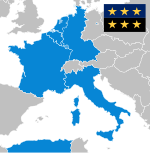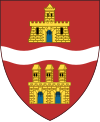Portal:European Union
Introduction
The European Union (EU) is a supranational political and economic union of 27 member states that are located primarily in Europe. The Union has a total area of 4,233,255 km2 (1,634,469 sq mi) and an estimated total population of over 449 million. The EU has often been described as a sui generis political entity combining the characteristics of both a federation and a confederation. Containing 5.8% of the world population in 2020, EU member states generated a nominal gross domestic product (GDP) of around US$16.6 trillion in 2022, constituting approximately one sixth of global nominal GDP. Additionally, all EU states except Bulgaria have a very high Human Development Index according to the United Nations Development Programme. Its cornerstone, the Customs Union, paved the way to establishing an internal single market based on standardised legal framework and legislation that applies in all member states in those matters, and only those matters, where the states have agreed to act as one. EU policies aim to ensure the free movement of people, goods, services and capital within the internal market; enact legislation in justice and home affairs; and maintain common policies on trade, agriculture, fisheries and regional development. Passport controls have been abolished for travel within the Schengen Area. The eurozone is a group composed of the 20 EU member states that have fully implemented the economic and monetary union and use the euro currency. Through the Common Foreign and Security Policy, the union has developed a role in external relations and defence. It maintains permanent diplomatic missions throughout the world and represents itself at the United Nations, the World Trade Organization, the G7 and the G20. Due to its global influence, the European Union has been described by some scholars as an emerging superpower. In 2012, the EU was awarded the Nobel Peace Prize. The United Kingdom became the only member state to leave the EU, in 2020; ten countries are aspiring or negotiating to join it. (Full article...) Selected article The ECSC was first proposed by French foreign minister Robert Schuman on 9 May 1950 as a way to prevent further war between France and Germany. He declared his aim was to 'make war not only unthinkable but materially impossible.' The means to do so, Europe's first supranational Community, was formally established in 1951 by the Treaty of Paris, signed not only by France and West Germany, but also by Italy and the three Benelux states: Belgium, Luxembourg and the Netherlands. Between these states the ECSC would create a common market for coal and steel. The ECSC was governed by a 'High Authority', checked by bodies representing governments, MPs and an independent judiciary. The ECSC was joined by two other similar communities in 1957, with whom it shared its membership and some institutions. In 1969 all its institutions were merged with that of the European Economic Community (EEC, which later became part of the European Union), but it retained its own independent identity. However in 2002 the Treaty of Paris expired, and with no desire to renew the treaty, all the ECSC activities and resources were absorbed by the European Community. During its existence, the ECSC had succeeded in creating a common market but could not prevent the decline of the coal and steel industries. It did however set the ground for the future European Union. Selected picturePhotograph: Myrabella The Hall of Mirrors is the central gallery of the Palace of Versailles in Versailles, France. Construction of the room began in 1678, lasting until 1684. It has since been used for various state functions, including the signing of the Treaty of Versailles in 1919.
Did you know?...that "Nocturne" is the Eurovision Song Contest winner with the fewest words, the Norwegian language original having only 25?  ...that the Eastgate Clock (pictured) in Chester is the second most photographed timepiece in the United Kingdom, after Big Ben? ...that "Kinek mondjam el vétkeimet?" received three perfect scores at the start of voting in the Eurovision Song Contest 1994 before ultimately coming in fourth, making Hungary the only debuting nation to lead the voting? Selected cityBudapest is the capital city of Hungary and the country's principal political, cultural, commercial, industrial and transportation center. Budapest has approximately 1.7 million inhabitants, down from a mid-1980s peak of 2.1 million. Budapest became a single city occupying both banks of the river Danube with the amalgamation on 17 November 1873 of right-bank Buda together with Pest on the left bank. It is the ninth largest city in the European Union. Budapest's recorded history begins with the Roman town of Aquincum, founded around AD 89 on the site of an earlier Celtic settlement near what was to become Óbuda, and from 106 until the end of the 4th century the capital of the province of lower Pannonia. The Hungarians led by Árpád settled in the territory at the end of the 9th century, and a century later officially founded the Kingdom of Hungary. Research places the probable residence of the Árpáds an early place of central power near what became Budapest. The Tatar invasion in the 13th century quickly proved that defence is difficult on a plain. King Béla IV of Hungary therefore ordered the construction of reinforced stone walls around the towns and set his own royal palace on the top of the protecting hills of Buda. In 1361 it became the capital of Hungary. General imagesThe following are images from various European Union-related articles on Wikipedia.
TopicsFeatured contentFeatured articles
Featured lists
Featured contentGood articles
CategoriesRelated portalsAssociated WikimediaThe following Wikimedia Foundation sister projects provide more on this subject:
Discover Wikipedia using portals |

































































